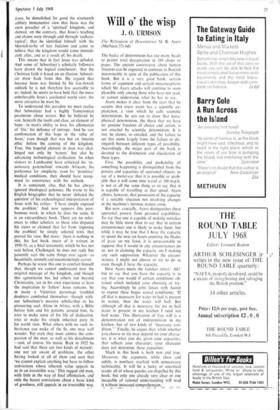Will o' the wisp
J. 0. URMSON
The hydra of determinism has too many heads to permit total decapitation in 180 chops or pages. The ancient controversy about human freedom can be expected to continue to flourish interminably in spite of the publication of this book. But it is a very good book; certain forms of argument and certain misconceptions which Mr Ayers attacks will continue to seem plausible only among those who have not read, or cannot understand, what he has to say.
Ayers makes it clear from the start that he accepts that every event has a scientific ex- planation, a view which he calls scientific determinism; he sets out to show that meta- physical determinism, the thesis that we have no genuine freedom of choice and action, is not entailed by scientific determinism. It is not, he claims, so entailed, and the failure to see this stems largely from the failure to dis- tinguish between different types of possibility. Accordingly, the major part of the book is devoted to the distinction and elucidation of these types.
First, the possibility and probability of something happening is distinguished from the powers and capacities of apersonal objects; to say of a motor-car that it is possible or prob- able that it will some time travel at 100 m.p.h. is not at all the same thing as to say that it is capable of travelling at that speed. Ayers allows, however, that possession of the capacity if a suitable situation not involving changes in the machine's intrinsic nature arose.
But now, crucially, Ayers distinguishes these apersonal powers from personal capabilities. To say that one is capable of making mistakes may be little more than to say that in certain circumstances one is likely to make them; but while it may be true that I have the capacity to spend the next six hours counting the blades of grass on my lawn, it is unreasonable to suppose that I would in any circumstances do so, nor in claiming the capacity am I making any such supposition. Whatever the circum- stances, I might not choose or try to do so even though I have the capacity.
Here Ayers meets the familiar retort: Ah! but to say that you have the capacity is to say that you would if certain conditions ob- tained which included your choosing or try- ing. Accordingly he joins forces with Austin to expose these bogus causal conditions: 'If all that is necessary for water to boil is present in nature, then the water will boil. But although all that is necessary for me to boil water is present in my kitchen I need not boil water. This illustration of free will is a demonstration not of indeterminism in my kitchen, but of two kinds of "necessary con- dition."' Finally, he argues that, while whether you choose or try may depend on your charac- ter, it is what you do, given your capacities, that reflects your character; your character does not determine these capacities.
Much in this book is both new and true. Moreover, the argument, while close and subtle, is nowhere overlaid with unnecessary technicality. It will be a lucky or uncritical reader all of whose puzzles are dispelled by this book; but only one already very clear or one incapable of rational understanding will read it without increased comprehension.
14 :Of qn










































 Previous page
Previous page